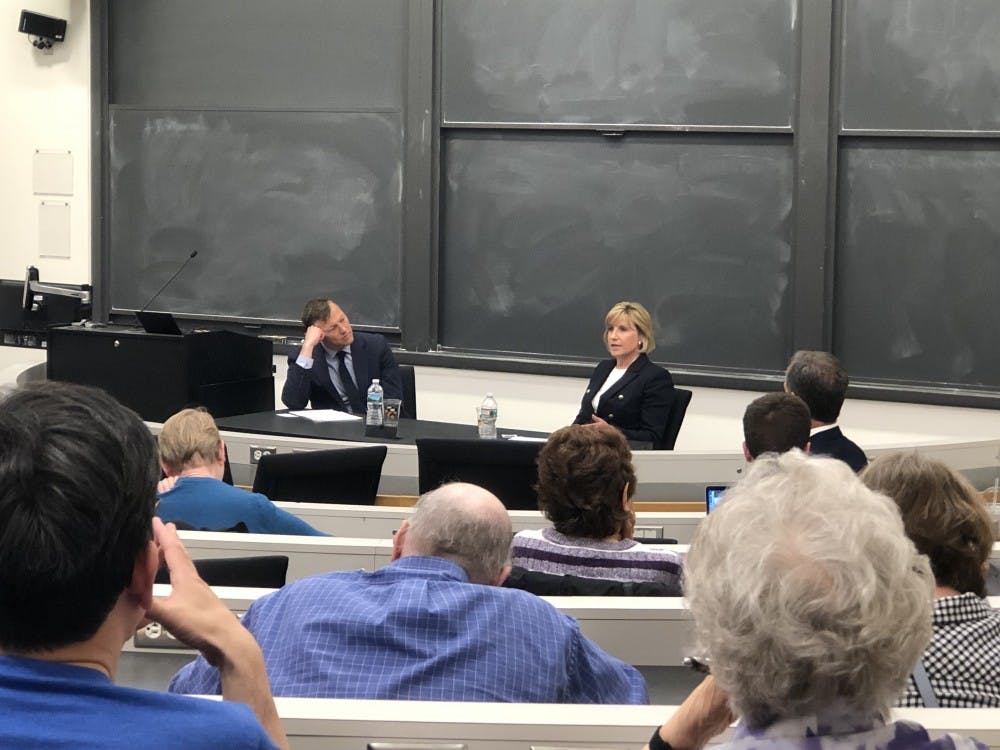On Monday, April 29, Pamela Hughes Patenaude, former Deputy Secretary for the U.S. Department of Housing and Urban Development (HUD), highlighted the challenges and nuances of federal housing policy throughout her time at the department during a public talk with sociology professor Matthew Desmond.
Patenaude was first nominated by President Donald Trump and later confirmed by the Senate for Deputy Secretary of HUD on September 14, 2017, according to the housing department’s website.
The department remained partly under her leadership until December 17, 2018, when the media reported that she was set to resign from her position in January 2019.
In the conversation with Desmond — who coordinated and hosted the event — Patenaude pointed out the bureaucratic nature of HUD.
“Nothing happens quickly in the federal government,” Patenaude said. “Certainly nothing gets done on the day that you ask for it to be done.”
Patenaude stated that she was a popular supporter of federal aid to Puerto Rico during her years of service under Trump and in previous administrations. However, because of the bureaucratic nature of HUD as well as a difference in priorities for the Trump administration, she did not believe that it received the proper amount of support.
“I want to be remembered as being an advocate for Puerto Rico, as the person who fought for it,” she said in regards to her efforts to increase government involvement in Puerto Rico’s housing crisis.
When she left office, Puerto Rico governor Ricardo Rosselló tweeted, “The entire nation loses one its finest, most transparent and passionate public servants."
The discussion centered heavily around the Fair Housing Act (FHA), a law passed in 1968 with the intention of preventing discrimination on the national, state, and local levels for people looking to purchase, rent, or mortgage a home or engage in other housing-related activities.
A major concern highlighted by the former secretary in regards to the FHA was the lack of legal and political knowledge possessed by policymakers in Capitol Hill and in Washington, D.C., at large.
Desmond first asked about policy enforcement and methods to investigate instances of housing discrimination, such as the recent HUD lawsuit against Facebook.
According to The Washington Post’s coverage of this particular lawsuit, “HUD claimed that Facebook mines users’ extensive personal data and uses characteristics protected by law ... to determine who can view housing ads, even when it’s not the advertiser’s intent.”

The investigation is in reference to discrimination against one or more of the ‘seven protected classes’ under the FHA: race, color, national origin, religion, familial status, sex, and disability.
Patenaude expressed concerns over a lack of leadership in Washington and the Facebook investigation, explaining that “the people who should be enforcing and implementing the law don’t even know the law.”
The former secretary was later asked why the Trump administration launched only one investigation into Facebook when other instances of housing discrimination also exist.
According to Desmond, the Bush and Obama administrations issued a greater number of citations against housing discrimination; each had administered at least ten major investigations during their terms.
“The damage is already done when you have to go after somebody for violating the law, although enforcement will hopefully prevent future violations of it,” Patenaude replied. “I think we’ve done a miserable job with fair housing at the federal level. It would be better that we never get to the point of investigation.”
In further discussing the FHA, Patenaude stated that redlining policies from the 1930s still affect Americans today, more than fifty years after the FHA was first passed.
Patenaude highlighted that concerns over housing discrimination are fairly recent in the grand overview of civil liberties. In reference to one’s obligations, she explained that “being a HUD official was something that was left undefined” until recently.
Towards the end of the interview, the conversation turned towards the political inclinations of the former secretary herself. While she identifies herself as a conservative and supporter for Trump, Patenaude’s policies are more liberal in comparison to other members of the Trump administration and HUD who served during her term, which may have contributed to her resignation.
“When you serve in a senate confirmed position, you’re serving at the pleasure of the President of the United States. He is the only person that could fire me,” she told the ‘Prince.’ Patenaude jokingly continued, “I did not get fired, although I did believe I would’ve gotten fired eventually.”
In her years of experience, the former secretary learned that the road to federal policymaking is very dependent upon the balance of political power in Washington.
“It’s a fine line because you want to continue policy disagreements and continue to go in directions that the people above you are not necessarily in line with,” Patenaude stated. “You either accept it and stick around, or it’s time move on. And I decided to move on.”
The talk was delivered at 4:30 p.m. at the Friend Center and was sponsored by the Woodrow Wilson School of Public and International Affairs.









